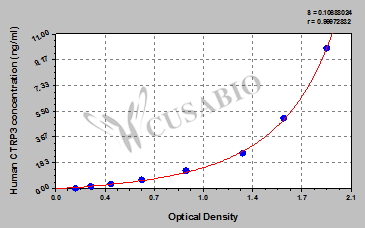This human CTRP3 ELISA kit employs the quantitative sandwich enzyme immunoassay technique to measure the levels of human CTRP3 in multiple samples, including serum, plasma, or cell culture supernates. Antibody specific for CTRP3 has been pre-coated onto the microplate. Standards and samples are pipetted into the wells and any CTRP3 present is bound by the immobilized antibody. After removing any unbound substances, a biotin-conjugated CTRP3 antibody is added to the wells. After washing, avidin conjugated HRP is added to the wells, forming an antibody-antigen-enzyme-labeled antibody complex. Following a wash to remove any unbound HRP-avidin, the TMB substrate solution is added to the wells, and the color develops into blue. The color changes from blue to yellow after the addition of stop solution into the wells. The color intensity is in proportion to the amount of CTRP3 bound in the initial step.
CTRP3 (C1QTNF3) is one of the anti-inflammatory adipocytokines and inversely correlates with pro-inflammatory cytokines such as IL-6, TNF, and CRP. It is involved in various physiological and pathological processes, including glucose/lipid metabolism, inflammation, proliferation, apoptosis, vascular calcification, fibrosis, ischemic injury, and cardiovascular protection. CTRP3 also influences some specific inflammatory disorders, such as immunoglobulin A nephropathy and inflammatory bowel disease. Apart from its role in inflammation, CTRP3 affects the differentiation and adipogenesis of adipocytes.






